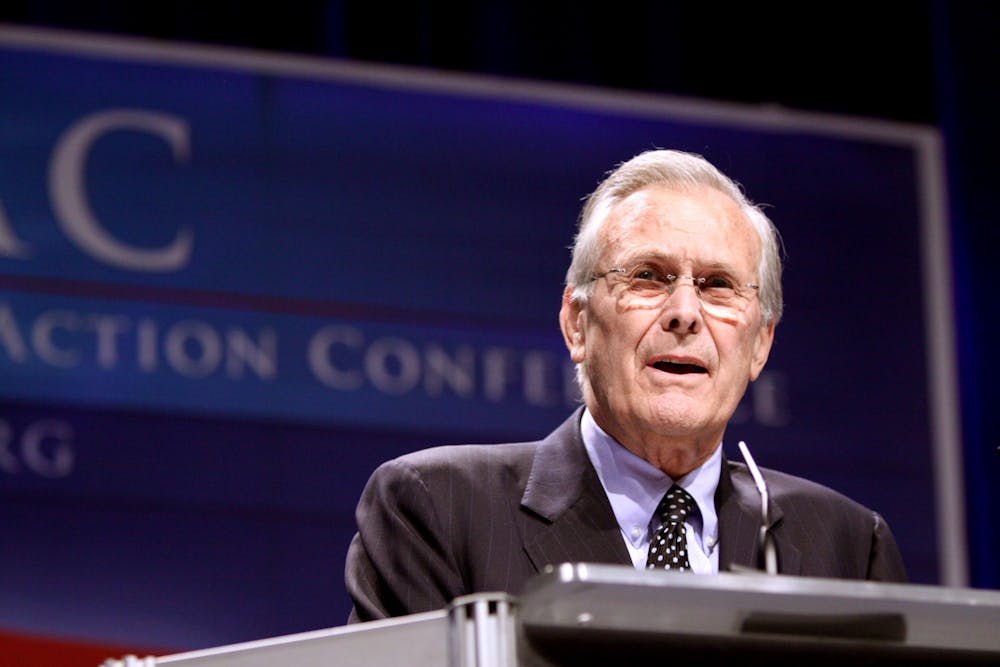Donald H. Rumsfeld ’54, a proponent behind the U.S. invasions of Afghanistan and Iraq who served twice as Secretary of Defense under President Gerald Ford and President George W. Bush, died on Tuesday, June 29th at his home in Taos, New Mexico. He was 88 years old.
According to Rumsfeld’s spokesman Keith Urbahn, the cause of death was multiple myeloma.
One of the most controversial and prominent undergraduate alumni of the University, Rumsfeld’s legacy from his long career in government and business was defined by his decisions behind the U.S. invasions of Iraq and Afghanistan under the administration of President George W. Bush. The two conflicts, one of which became the longest in U.S. history, have cost trillions of dollars and hundreds of thousands of lives. Rumsfeld’s tenure as Pentagon chief under Bush has left a long-lasting impact on U.S. foreign policy that remains consequential to this day.
Studying at the University with the support of a Naval Reserve Officer Training Corps (NROTC) scholarship, Rumsfeld was a member of Cap and Gown Club and captained the varsity wrestling team as well as the lightweight football team. While a student at the University, he befriended Frank Carlucci ’52, who later served as Secretary of Defense under President Ronald Reagan.
Rumsfeld graduated from the University with an A.B. in Politics in 1954 after completing a senior thesis titled “The Steel Seizure Case of 1952 and Its Effects on Presidential Powers.”
After graduation, Rumsfeld entered the U.S. Navy and served on active duty as a fighter pilot and a flight instructor until 1957. He married his high school sweetheart Joyce Pierson in December of 1954.
In a recent statement, Professor Robert P. George, Director of the James Madison Program, referred to Rumsfeld as a “loyal and enthusiastic Princeton alumnus who believed in our University’s high ideals of scholarship, leadership, and public spiritedness.”
“I will always be grateful for his friendship and for his generosity to the University and our Program,” George said.
Rumsfeld’s long career in government began with three terms in the House of Representatives, in which he voted in favor of the Voting Rights Act of 1965. He was re-elected to a fourth term, but resigned to serve as the Nixon administration’s Director of the Office of Economic Opportunity. He later became the U.S. Ambassador to NATO.
Rumsfeld continued to serve under President Gerald Ford after Nixon’s resignation, first as Ford’s White House Chief of Staff and then as Secretary of Defense, the youngest to have ever held the post.
Rumsfeld’s most well-known and most contentious legacy comes from his second term as defense secretary, this time as the oldest individual to ever hold the post.

He entered office with the aspiration of transforming the U.S. military into a more modernized force by slashing the Pentagon's bureaucracy, deploying more efficient weapons systems, and creating smaller and more agile special forces units with the ability to swiftly respond to threats in various parts of the globe.
However, his ability to concentrate on achieving those goals were derailed less than a year after he began his term by the terrorist attacks of Sept. 11, 2001.
Under the leadership of President Bush and Rumsfeld, the United States invaded Afghanistan in October of 2001 and toppled the Taliban regime, but the operation soon turned into a quagmire that became the United States’ longest war.
The most infamous chapter of Rumsfeld’s legacy took place when he became a vocal supporter behind the decision to invade Iraq and depose dictator Saddam Hussein on the grounds that his regime possessed weapons of mass destruction (WMDs) and had ties to Al-Qaeda, presumptions that proved unsubstantiated.
Rumsfeld’s decision-making during the invasion of Iraq became widely criticized, with many believing the U.S. did not deploy sufficient forces to maintain stability in the region after the swift defeat of Hussein’s military. In addition, the abuse of detainees at the Abu Ghraib Prison near Baghdad and at the Guantánamo Bay detention camp in Cuba caused Rumsfeld to be branded as a war criminal by numerous human rights groups.
President Bush initially rejected Rumsfeld’s offer to resign, but the Democratic victories in the 2006 midterm elections induced Bush to replace Rumsfeld with Robert Gates.
By the time Rumsfeld left office in 2006, thousands of U.S. troops and hundreds of thousands of Iraqi civilians had been killed in the conflict that is estimated to have cost trillions of dollars and, according to critics, laid the groundwork for the rise of the Islamic State.
Rumsfeld is survived by his wife Joyce; their children, Valerie, Marcy, and Nicholas; seven grandchildren; and three great-grandchildren.








